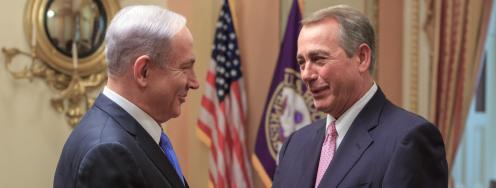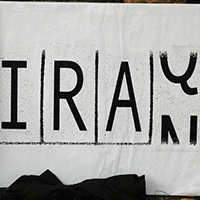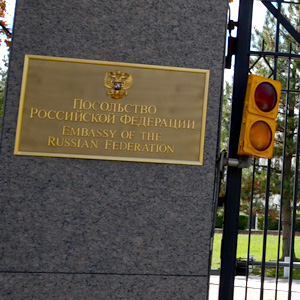White House Makes the Case for Iran Diplomacy
On the radar: Let the talks play out; the Benefits of a fair deal; New CBO numbers; Analyzing the Corker bill; Nukes in Europe; and Congressional poison pills.
Rice - In advance of Israeli Prime Minister Benjamin Netanyahu’s address to Congress, President Obama and National Security Advisor Susan Rice made strong arguments for supporting the Iran nuclear negotiations.
--“Sound bites won’t stop Iran from getting a nuclear weapon. Strong diplomacy – backed by pressure – can,” Rice said. “We cannot let a totally unachievable ideal stand in the way of a good deal. As desirable as that [zero enrichment] would be, it is neither realistic nor achievable.”
--“Congress has played a hugely important role in helping to build our sanctions on Iran, but they shouldn’t play the spoiler now. Additional sanctions or restrictive legislation enacted during the negotiation would blow up the talks, divide the international community, and cause the United States to be blamed for the failure to reach a deal.” Full transcript of Rice’s remarks here. http://1.usa.gov/1Ed7o0T
Obama - “We should let these negotiations play out," President Obama said in an exclusive interview with Reuters yesterday. “If, in fact, Iran is willing to agree to double-digit years of keeping their program where it is right now… if we’ve got that and we’ve got a way of verifying that… it would be far more effective in controlling their nuclear program than any military action we could take, any military action Israel could take and far more effective than sanctions will be.”
--On Congressional action, the president said, “there’s no expert on Iran or nuclear proliferation around the world that seriously thinks that Iran is going to respond to additional sanctions by eliminating its nuclear program… What we should not do is pre-judge the deal and initiate sanctions that might allow Iran to walk away and claim that the United States is the one that has eliminated the path to diplomacy.” Full transcript here. http://reut.rs/1Eb8zOv
A fair deal - “Not only is the compromise fair - a better one will be very hard to reach,” argues Avner Cohen in Haaretz. “There is only one alternative: continued sanctions, the collapse of the interim agreement, renewed enrichment, and in the end military conflict. It should be clear to everyone: America (including the Republicans) clearly prefers a reasonable compromise over a military conflict.”
--The agreement “clearly distances Iran from a nuclear bomb — from a few weeks as was the case in 2012 to about a year. Most importantly, it establishes a regime of safeguards and transparency for almost a generation.” Full column (paywall) here. http://bit.ly/1EaOI1J
Budget update - The CBO has released new supplementary data tables for its report, “Projected Costs of U.S. Nuclear Forces, 2015 to 2024.” Full report and updated data available here. http://1.usa.gov/1Cpuf8O
Analysis - “The Corker bill will endanger both the negotiations and the sanctions regime; it does not merit support,” writes Ed Levine of the Center for Arms Control and Non-Proliferation in a new analysis of the latest Iran bill.
--The Corker bill could: help Iran’s own hard-liners to scuttle the negotiations; delay U.S. compliance with any agreement by up to 65 days; move the goalposts for a deal; and in the wake of failed negotiations, it could cause our P5+1 negotiating partners to abandon the international sanctions on which we have relied to encourage Iranian flexibility. Full analysis here (pdf) http://bit.ly/1zBpOAY
Bad idea - Russia’s belligerence in Ukraine has prompted calls to abandon long-standing nuclear arms control efforts and bolster U.S. nuclear forces in Europe. “Heeding these calls would be counterproductive and self-defeating,” argues Kingston Reif in War on the Rocks. “Not only would enhancing U.S. nuclear capabilities in Europe be unlikely to deter Russia from continuing to destabilize Ukraine… but it would be provocative, divisive, and expensive.” Full column here. http://bit.ly/1CpA3iT
Tweet - @GlobeBender: For a real downer take a look @NoradNorthcom's recently declassified 'Nuclear Weapon Accident Response Plan.' http://bit.ly/18hyRAw
Alternatives - “The Obama administration is pursuing an imperfect deal with Iran, but one that is far superior to any of the realistic alternatives,” writes Ilan Goldenberg in U.S. News. “If the talks collapse, the United States will impose tougher sanctions and Iran will restart its nuclear program... Very soon the United States may be forced to choose between military action… or the equally unappealing option of allowing Iran to become a nuclear weapons state. Full column here. http://bit.ly/1zEsaih
Ghosts of Iraq - “Some Democrats, determined to repeat the deadly errors of the Bush years, are considering siding with right-wing Republicans to undermine Obama’s diplomacy that could potentially lead our nation into another war in the Middle East,” write Anna Galland and Becky Bond in Roll Call.
--“If a sanctions bill passes while talks are ongoing or Congress makes it impossible to guarantee implementation of a final deal reached by the president, the negotiations will be dead and the United States will be seen as the spoiler.” http://bit.ly/1M3joS3
Quick Hits:
--“Orban’s Party to Make Russian Nuclear Deal a 30-Year Secret,” by Zoltan Simon in Bloomberg Business. http://bloom.bg/1CmxHRy
--“Pentagon’s $55 billion mystery plane is secret, but debate on cost is appearing,” by Christian Davenport in The Washington Post. http://wapo.st/1B4NgdH
Events:
--“Reinvent Nuclear Security: Developing Next-Generation Innovators.” March 3 at 2:00 p.m. EST. Featuring Erika Gregory of N Square, and other participants. Online webinar sponsored by N Square. RSVP online. http://bit.ly/1M3GuK6
--“Senate Armed Services Committee, hearing on the Defense Department budget.” With Defense Secretary Ashton Carter and Joint Chiefs Chairman Gen. Martin Dempsey. March 3 at 2:30 p.m. located at 216 Hart Senate Office Building, Washington DC. Webcast on the committee website. http://1.usa.gov/RmEbep
--“The Iran Nuclear Issue: Current State of Play.” Featuring Thomas Pickering, former Undersecretary of State for Political Affairs; Jessica Mathews, Carnegie Endowment; Suzanne Maloney, Brookings Institution. March 3 at 3:30-5:00 PM. Located at the University of Maryland, Colony Ballroom, Stamp Student Union, College Park, MD. RSVP online. http://bit.ly/17KDDGP
--“House Appropriations Subcommittee on Energy and Water, hearing on the Weapons Activities budget of the National Nuclear Security Administration (NNSA).” With Frank Klotz, Administrator, NNSA, Don Cook, Deputy Administrator for Defense Programs, NNSA; and Brig. Gen. Stephen Davis, Principal Assistant Deputy Administrator for Military Applications, NNSA. March 4 at 1:00 PM. Located at 2362-B Rayburn House Office Building, Washington DC. Webcast on the committee website. http://1.usa.gov/17KE83y
--“Senate Armed Services Subcommittee on Strategic Forces, hearing on "U.S. Nuclear Weapons Policy, Programs and Strategy." With Frank Kendall, Undersecretary of Defense for Acquisition, Technology and Logistics; Brian McKeon, Principal Deputy Undersecretary of Defense for Policy; Michael Elliott, Deputy Director for Strategic Stability, Strategic Plans and Policy Directorate, Joint Chiefs of Staff; Adm. Cecil Haney, Commander, U.S. Strategic Command; and Frank Klotz, Administrator, National Nuclear Security Administration. March 4 at 3:30 PM. Located at 222 Russell Senate Office Building, Washington. Webcast on the committee website. http://1.usa.gov/17KENCd
--Senate Armed Services Committee, hearing on “Postures of the Department of the Army and the Department of the Air Force.” With Gen. Raymond Odierno, Chief of Staff, U.S. Army; Mark Welsh, Chief of Staff, Air Force; Deborah Lee James, Air Force Secretary; and John McHugh, Army Secretary. March 5 at 9:30 AM. Located at G-50 Dirksen Senate Office Building, Washington, DC. Webcast on the committee website. http://1.usa.gov/1aJjDWT
--“Senate Appropriations Subcommittee on Energy and Water, hearing on the National Nuclear Security Administration (NNSA) budget. With Frank Klotz, Administrator, NNSA. March 11, Time TBA, Room TBA, Dirksen Senate Office Building, Washington, DC. Webcast on the committee website. http://1.usa.gov/1itSTpx
Dessert:
Serious vulnerabilities - At about half past two in the morning on July 28, 2012 three peace activists, supporters of the anti-nuclear Plowshares movement, broke into the Y-12 nuclear complex. Their objective was not to steal nuclear material, or destroy government property, but rather to make a statement.
-- As Eric Schlosser writes for the The New Yorker their actions “have not only revealed serious vulnerabilities in the security of America’s nuclear enterprise; they’ve also shed light on the inherent risks faced by every nation that possesses weapons of mass destruction.” Read Schlosser’s detailed account of the Y-12 break in and the history of the Plowshares movement here. http://nyr.kr/1zRowD1



